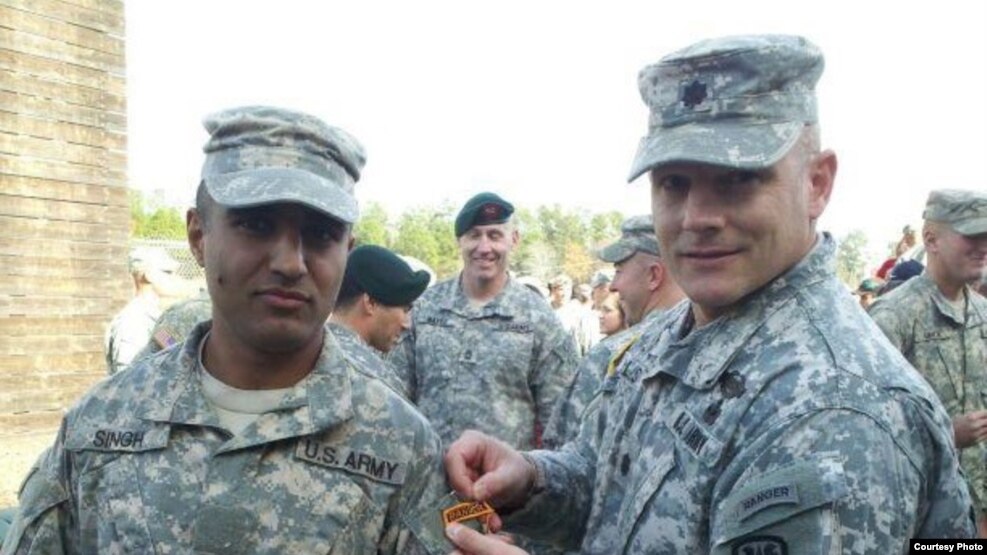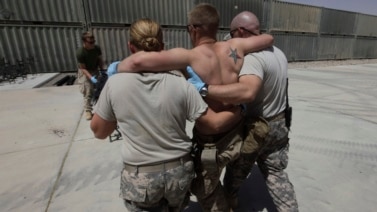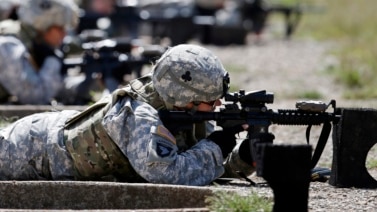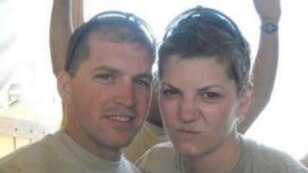
The United States Army has agreed to let a Sikh man wear uncut hair and a turban while serving in the military.
The Army announced its decision on Captain Simratpal Singh at the end of March.
Ten years ago, Singh entered the U.S. Military Academy in West Point, New York. At the time, he cut his long hair because of the military's rules about physical appearance.
The Sikh religion bars men from having haircuts. Sikh men let their hair grow. Men are also required to wear a turban on their heads as a sign of their religious beliefs.
Singh thought the Army would only let him serve if he cut his hair. He told VOA it was a difficult decision. But the day he entered West Point, he promised himself he would find a way to return to his religion.
"It was excruciating experience and an excruciating decision to make, and the only way I could justify it then was that promise I made to myself. And to be honest with you, I wouldn't want any kid to have to go through that.”
Singh completed his studies at the military academy in 2010. He then became an Army Ranger and was sent to Afghanistan in 2012. He received the Bronze Star, an award for his military service.
The U.S. Army has let more than 100,000 soldiers keep their beards for medical reasons since 2007. But 10 years after he joined, Singh has had a difficult time getting the same treatment.
Last year, he asked the Army to let him follow Sikh religious rules on appearance. The Army gave him a temporary exemption, so that he could let his hair grow. But the Army then asked him to go through $32,000 in tests before agreeing to a long-term exemption.
Part of the testing required him to show that he could put on and remove a gas mask without his hair causing problems.
Singh then decided to take the Army to court because of the testing requirement. US District Judge Beryl Howell chose to block the testing in March because of concerns about Singh's right to religious freedom.
"Thousands of other soldiers [can] wear long hair and beards for medical or other reasons, without … such specialized and costly expert testing," Howell wrote.
The judge also stated that Singh had already completed a standard gas mask test successfully.
Singh is the first active-duty Sikh US soldier to receive this kind of exemption since the defense department began making changes two years ago. U.S. military leaders also have taken steps to ease rules about appearance for other religious groups.
Attorney Amandeep Sidhu represented Singh in his case against the military. Sidhu says the fight is far from over. The Army still asks Sikhs to prove their hair, beards and turbans have no effect on the health and safety of their military units or how well they operate.
“Yes, Sikhs have served in the US military, but we'll prove it to you again, and these guys will deploy to Afghanistan and they will seal their gas masks and they will wear helmets.”
Eric Baxter is another lawyer for Singh. He says it is the responsibility of the Army to include every soldier.
"Whenever the Army has had to expand to include minorities, or women or others, you don't say, 'Well, let's see if this upsets the soldiers.' You tell the other soldiers to get in line and respect all Americans.”
The exemption for Singh is not permanent and the Army can remove it at any time. But Singh is happy knowing he kept his promise to return to his beliefs.
"Ten years later … to be true to myself, is a pretty extraordinary feeling.”
Singh and other Sikh soldiers like him hope that these exemptions become permanent. He does not want other Sikhs hoping to join the military to have to choose between their country and their religion.
I'm Pete Musto.
Aru Pande reported this story for VOANews.com. Pete Musto adapted the report for Learning English. Additional information came from the Reuters news service. George Grow was the editor.
Now it's your turn. Should members of religious groups in the military should be able to wear what their religion tell them to? Should the military have less rules about how soldiers look? Let us know in the comments section or on our Facebook page.
Words in This Story
turban - n. a head covering that is worn especially by men in some parts of the Middle East and in southern Asia and that is made of a long cloth wrapped around the head
appearance - n. the way that someone or something looks
excruciating - adj. causing great mental or physical pain
justify - v. to prove or show something to be just, right, or reasonable
beard(s) - n. the hair that grows on a man's cheeks and chin
exemption - n. freedom from being required to do something that others are required to do
gas mask - n. a mask used to protect the face and lungs against poisonous gases
active-duty - n. full-time service in the police or armed forces
attorney - n. a person whose job is to guide and assist people in matters relating to the law
unit(s) - n. a single thing, person, or group that is a part of something larger
deploy - v. to organize and send out people or things to be used for a particular purpose
seal - v. to close something tightly so that air or liquid cannot get in or out
helmet(s) - n. a hard hat that is worn to protect your head
extraordinary - adj. extremely good or impressive


